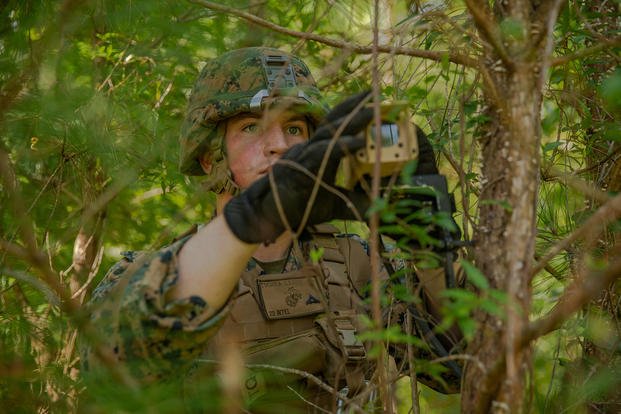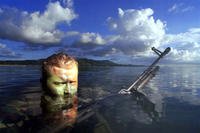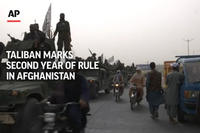Marines of Golf Company, 1st platoon, 2nd Intelligence Battalion, II Marine Expeditionary Force Headquarters Group conducted a field exercise from Aug. 12-16, 2013. The exercise was the culminating event for the unit's basic intelligence training course and tested a variety of skills and procedures learned and retained from the course.
On Nov. 1, 2012, 2nd Intel. Bn. initiated a complete restructuring of all organically sourced billets. Ten years of rotational deployments had created a garrison structure of functional "stove pipes" that hindered manning, training and equipping scalable multi-discipline intelligence capabilities. The battalion reorganized into three companies (E, F, G), each with three multi-discipline intelligence platoons.
"As the Marine Corps transitions out of Afghanistan and the future operating environment becomes more nebulous, our intelligence support to the war fighter must become more flexible and responsive," said 1st Lt. Lucas Helms, training officer for 2nd Intel. Bn, II MHG.
One of the ways 2nd Intel. Bn. has sought to enable more of an expeditionary capability is through the formation of multi-discipline intelligence platoons. These platoons consist of Marines from the five intelligence occupational specialties resident within the unit: counterintelligence/human intelligence, intelligence specialist, imagery analysis, topographic intelligence and meteorological/oceanographic specialist.
The multi-discipline construct is a scalable concept. Organically, each platoon has the appropriate amount and types of Marines and equipment required to support a Marine Expeditionary Unit, while a company is designed to support a Marine Expeditionary Brigade. These units also can be task-organized for unique mission sets and to fit the requirements of a Special Purpose Marine Air Ground Task Force. Golf Company, 1st platoon forms the core of the intelligence support for 2nd MEB when required.
Leading the platoon during the field exercise, 1st Lt. Jarrod Girod oversees the analysis of intelligence information and the development of intelligence products.
"Although a lot of the Marines out here are young, their passion for the intelligence process is remarkable," Girod said. "Through effective communication between the various [occupational fields], we have been able to build a cohesive unit capable of working on a variety of intelligence problems."
Throughout the field exercise, the Marines focused their effort on fictional scenarios, loosely based on historically relevant real-world problems.
"By exercising the platoon's various capabilities simultaneously, we can nail-down internal [Tactics, Techniques & Procedures] that allow us to rapidly respond during contingencies," Girod said.
Another significant objective of the field training evolution is to exercise the battalion's supporting functions.
"Our Marines have been used to deploying to the same [area of operations] over and over and falling in on an established infrastructure," Helms said. "This type of field training allows us to get back to our expeditionary roots through the utilization of organic equipment and self-established communications networks."
Although approximately 80% of 2nd Intel. Bn. currently is deployed, serving in a dedicated reach-back role or (in the pre-deployment training program) for an upcoming deployment; field training still occurs at a regular interval. Elements of the battalion will conduct a total of four field exercises in August and September.
While the high operational tempo and training schedule keeps the Marines of 2nd Intel. Bn. busy, the ever-changing operational environment demands constant preparation. Lt. Col. Edward Sullivan, commanding officer of 2nd Intel. Bn., II MHG, is pleased to see the transition in his Marines and their ability to adapt to contingencies.
"In the last decade, the collective experiences of the [Marine Air Ground Task Force] have raised intelligence to a place of primacy within the operating forces," Sullivan said. "Looking forward, though, it is clear that in the place of predictive, repetitive deployments to the same or similar operational environments with hard-wired infrastructure awaiting us, we must now be prepared for the uncertainty of expeditionary operations.
"Failing to adapt to this reality would quickly relegate the intelligence disciplines to the operational 'back seat' within the [Marine Expeditionary Force]. We have to raise our level of all-around proficiency if we wish to be taken seriously as a community."
Want to Know More About the Military?
Be sure to get the latest news about the U.S. military, as well as critical info about how to join and all the benefits of service. Subscribe to Military.com and receive customized updates delivered straight to your inbox.











